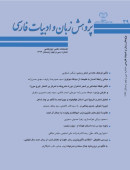بررسی تطبیقی- انتقادی تأثیرپذیری رمان «طوبا و معنای شب» از رمان «صد سال تنهایی» با تأکید بر درونمایه جدال سنت و مدرنیته
محورهای موضوعی : پژوهشهای ادبیات کلاسیک ایراننادر شایگان فر 1 , زینب صابر 2
1 - دانشگاه هنر اصفهان
2 - فلسفه هنر
کلید واژه: صد سال تنهایی طوبا و معنای شب رئالیسم جادویی سنت مدرنیته طنز.,
چکیده مقاله :
در مقالۀ حاضر، تأثیرپذیری رمان «طوبا و معنای شب» اثر «شهرنوش پارسی پور» از رمان «صد سال تنهایی» اثر «گابریل گارسیا مارکز» با نگاهی تطبیقی- انتقادی مورد تأمل قرار می گیرد. مواجهه و جدال میان سنت و مدرنیته را می توان یکی از مهمترین درون مایه های مشترک بین این دو رمان دانست. این نوشتار میکوشد تا چگونگی رابطۀ گفتمانی و بینامتنی این دو رمان را از طریق خوانشی محتوایی و با تأکید بر درون مايه هاي مشترك این دو اثر نمایان سازد. همچنین سعی بر این است تا با تکیه بر صداها و همهمه های موجود در رمان، نحوۀ مواجهۀ این دو اثر با دنیای جدید را نشان دهد و تبیین نماید که مؤلفان این دو اثر، چگونه با درهم آمیزی واقعيت و توهم، جهان فيزيكي و متافيزيكي و مرگ و زندگي به گفت وگوی با دنیای مدرن پرداخته اند. در این مقاله پس از یک مطالعه تطبیقی، همچنین بر آنیم تا از منظری انتقادی به وجوه موجود در دو رمان، با توجه به دو گفتمان سنت و مدرنیته التفات کرده و نشان دهیم چگونه پارسی پور در روایت خود دچار گسست و دوپارگی شده است؛ به نحوی که «طوبا و معنای شب» هرگز به صلابت و پیچیدگی «صد سال تنهایی» نیست و به همین دلیل در به کار بردن عناصری چون طنز، باورپذیری شخصیت ها و همبستگی معنادار اتفاقات داستان، تاحدودی ناتوان است. همچنین شاهد آنیم که واکنش به بیگانگان در «صد سال تنهایی» به طور واضح انتقادی، اعتراضی و صریح است، در حالی که «طوبا و معنای شب» موضع گیری مغشوش، سردرگم و تاحدودی منفعلانه دارد.
In this paper, the influence of One Hundred Years of Solitude by Gabriel García Márquez on Touba and the Meaning of Night by Shahrnush Parsipur is discussed through a comparative-critical approach. In these two novels, confrontation and conflict between tradition and modernity is one of the most significant themes. So, this paper tries to depict the discursive and inter-textual connection between the above mentioned novels based on their similar content and themes. It also aims at demonstrating the way these two work confront the modern world based on the voices in the novels, explaining how the authors of these two novels, had a dialogue with modern world through a fusion of reality and illusion, physical and metaphysical world; and death and life. After a comparative study, this paper aims at revealing different aspects in these two novels regarding the discourse of tradition and modernity, according to a critical approach. It will be revealed how Parsipur’s narration suffers from the lack of integrity and coherence, in a way that “Touba and the meaning of night” doesn’t have the same firmness and complexity of One Hundred Years of Solitude. As a result, it couldn’t make proper use of elements like irony, credibility of characters and significant correlation of the events. In One Hundred Years of Solitude, the reaction to the foreigners is evidently critical, explicit, and contradictory. While, in Touba and the Meaning of Night, this reaction is chaotic, confused and somehow passive
آلن، گراهام (1380) بینامتنیت، ترجمه¬ پیام یزدانجو، تهران، مرکز.#
احمدی، بابک (1380) ساختار و تأویل متن، تهران، مرکز.#
باختین، میخاییل (1380) سودای مکالمه، خنده، آزادی، ترجمه محمدجعفر پوینده، تهران، چشمه.#
------------- (1384) زیباییشناسی و نظریه رمان، ترجمه آذین حسین زاده، تهران، مرکز مطالعات و تحقیقات هنری.#
------------- (1387) تخیل مکالمه¬ای (جستارهایی دربارۀ رمان)، ترجمه رؤیا پورآذر، تهران، نی.#
پارسی¬پور، شهرنوش (1382) طوبا و معنای شب، تهران، البرز.#
تودورف، تزوتان (1377) منطق گفت¬وگویی میخاییل باختین، ترجمه داریوش کریمی، تهران، مرکز.#
سلدن، رامان (1375) نظریۀ ادبی و نقد عملی، ترجمه جلیل سخنور و سیما زمانی، تهران، پویندگان نور.#
سید، دیوید (1382) قرائتی نقادانه از رمان چهرۀ مرد هنرمند در جوانی، ترجمه منوچهر بدیعی، تهران، روزنگار.#
گارسیا مارکز، گابریل (1357) صد سال تنهایی، ترجمه بهمن فرزانه، تهران، امیرکبیر.#
گلشیری، هوشنگ (1388) باغ در باغ، جلد اول، چاپ سوم، تهران، نیلوفر.#
مکاریک، ریما ایرانا (1383) دانشنامه نظریههای ادبی، ترجمه مهران مهاجر و محمد نبوی، تهران، آگاه.#
میرعابدینی، حسن (1387) صد سال داستان¬نویسی ایران، چاپ پنجم، تهران، چشمه.#
هدايت، صادق (1348) بوف كور، چاپ دوازدهم، تهران، کتاب¬های پرستو.#
Bakhtin, Mihkail (1984a) Problems of Dostovesky,s Poetic, trans .C. Emerson and M. Manchester, Manchester University press.#
------------------ (1984b) Rabelais and His World, trans. By: H. isowolsky, Cambridge MA: MTT Press.#


